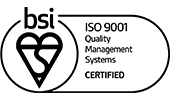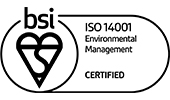Every now and then, an organisation will jump out as having an especially strong company culture. When that happens, we like to acknowledge it.
Having already looked at Google and Netflix, who recently updated their culture document for the first time in 8 years, Airbnb caught our eye.
With multiple offices across the globe, we thought we’d take a look at both their company culture and worldwide workplaces.

Sound and censored advice
Apparently, Airbnb CEO, Brian Chesky, was given some four-letter-laden advice in his early days that he decided to stick to.
“Don’t **** up the culture.”
In 2014, Chesky clarified why he thought culture should be an important focus for businesses.
“The stronger the culture, the less corporate process a company needs. When the culture is strong, you can trust everyone to do the right thing. People can be independent and autonomous. They can be entrepreneurial.”
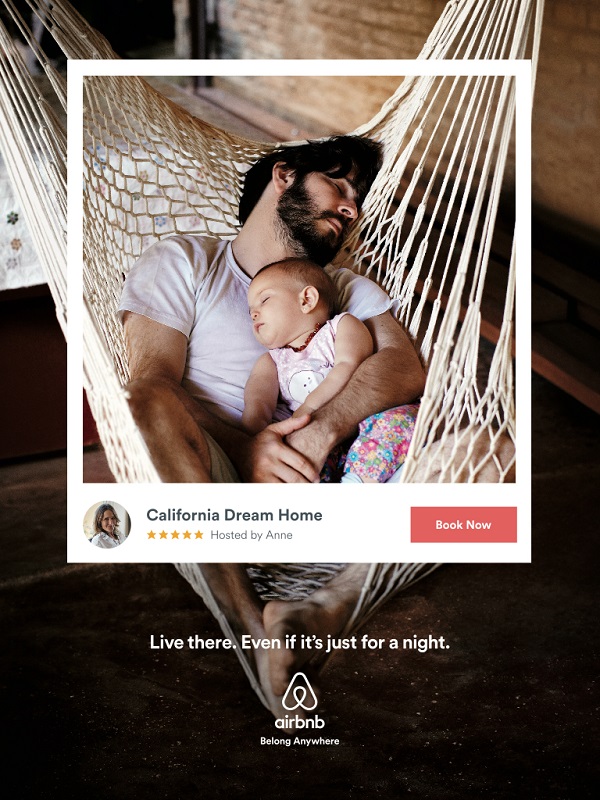
The sharing economy
The concept behind Airbnb is based on what’s been dubbed the sharing economy.
Uber shares the same basic concept but has suffered rather publicly as a result of its culture problems.
Airbnb doesn’t own any of its assets or directly employ any of the people that host the accommodation it offers.
As a result, it’s more of a digital franchise and shares many of the cultural features that companies in the digital sphere embrace.
As they grew, Airbnb retained an environment that was creative, fun and connected employees to a shared mission, summed up in their “Belong Anywhere” branding strategy.

The ingredients for a great company culture
Back in 2014, having been named Company of the Year, Brian Chesky gave a talk at Stanford University to start-ups about the importance of culture.
Chesky set out the steps he followed to create a great company culture:
Intimidatingly good staff
Surround yourself with people that are so good they intimidate you.
When you build a team that’s so talented they make you feel slightly uncomfortable, it makes everyone raise their game.
Build a company
After creating a product or service, focus on building a company with a clear mission with defined values. Without that, the product won’t last.
That’s why Chesky created the brand values for Airbnb before he hired one person.

Take your time to find your first employee
Chesky took 6 months to hunt through thousands of applications, interviewing hundreds of people before he hired his first member of staff.
He saw it as bringing new DNA into the business, viewing it as a long-term strategy and the benchmark for every other member of staff to come.
The long game
Building a culture is an investment. It might slow progress in the short term and it won’t happen overnight, but businesses will definitely see the benefits for many years to come.

We Accept
Probably the best illustration of Airbnb’s commitment to culture can be found on the careers and diversity pages of their website
The careers page clearly states the three things they value; to create, to learn and to play. And sums up their culture in one paragraph.
“No global movement springs from individuals. It takes an entire team united behind something big. Together, we work hard, we laugh a lot, we brainstorm nonstop, we use hundreds of Post-Its a week, and we give the best high-fives in town.”

Their diversity page features a message from Brian Chesky that highlights the evolution of the brand and the fact that it was founded on the concept that every community should be a place where you can belong.
This message of inclusivity was also the focus of their recent TV advert during the 2017 Super Bowl.
It’s also evident in the workplace design for their many offices across the world.
Airbnb – The Offices
With 19 offices across the world, Airbnb put as much focus on reflecting the culture of the country they are based in as they do the culture of the business.
Here are few examples:
Airbnb San Francisco
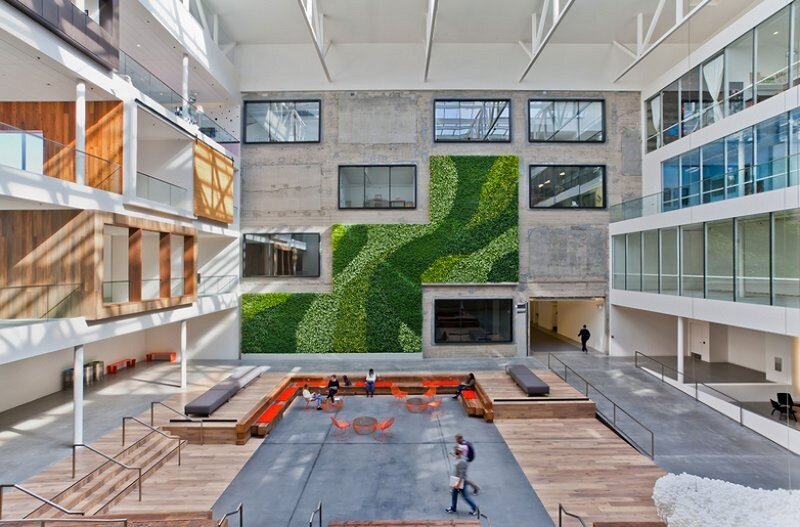
Image © Emily Hagopian
At their headquarters in San Francisco, Gensler was tasked with reflecting the company’s ethos of openness, collaboration and constant enterprise.
The five-story historic industrial building, dating from 1917 has a warehouse atrium featuring a three-floor green wall.
Throughout the space, rooms have been designed to replicate actual Airbnb listings.
Recently, Airbnb has been in talks to lease an extra building just around the corner from their HQ, giving them around 650,000 square feet of office space in the city!
Airbnb London

Image: Threefold Architects
Working with the architecture firm, Threefold, the London offices aim to showcase the architectural history of London and the rest of the UK.
A central “village green” space has a range of uses from informal working to presentations.
Based on a traditional farmhouse, a kitchen-like space forms the social hub of the office.
Airbnb Sao Paulo

Photography: Fran Parente
Partnering with MM18, Airbnb’s team in Brazil moved from a small start-up space into a larger office.
Using local fabricators, office furniture designers, textile makers, and industrial designers, they wanted the office to belong to the culture of its country.
Around the kitchen, bench and terrace seating inspired by Brazilian landscape architect, Burle Marx, can be used for large gatherings and presentations.
Airbnb Dublin
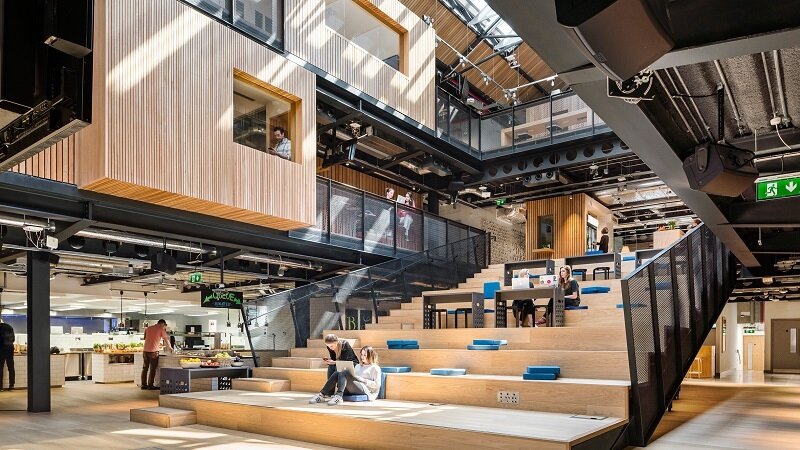
Photography: Donal Murphy
Airbnb’s new headquarters in Dublin marked the first opportunity for them to determine the architectural layout of one of their offices.
Working with Heneghan Peng Architects and using feedback from their own staff, they created a neighbourhood concept which divided the space into primary and secondary workspaces.
The neighbourhoods are connected across the basement and first floor by a bleacher-style staircase which can be used as a conference space and “lounge-style” working environment.
Airbnb Paris

Photography: Donal Murphy
Working with Studios Architecture, Airbnb wanted their new office in the French capital to look like a Parisian loft.
With a foyer, salon, bibliotèque (library) and, on the sixth floor, a solarium/greenhouse, the look was completed with furniture sourced from local flea markets and an upcycling company.
Departing from Dublin’s and San Francisco’s “neighbourhood” approach, staff sit at large custom-made tables in a communal workspace to encourage collaboration.
Consistent culture
Across their recruitment process, missions and values, advertising and the design of their offices, Airbnb has created and maintained a consistent, coherent culture
It’s taken some hard work and a fair bit of time to achieve this, but it certainly proves that it can be done.






